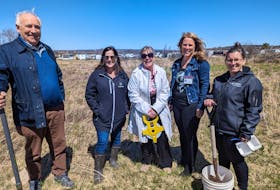Be prepared and be aware of what’s happening with your fishing vessel and others while out on the water — this is the best line of defense in readying for accidents while out on the water.
Halifax Joint Rescue Coordination Centre (JRCC) Maritime Co-ordinator Sean Arbour says this is because seeing or hearing something as it’s happening over the radio, and either having the equipment to respond to the issue, or calling in as soon as it happens, is a crucial step in increasing the odds of a successful rescue.
And staying alert is as simple as keeping an ear tuned to Marine VHF radio channel 16, which could be used by vessels to broadcast mayday calls or by the JRCC while broadcasting to look for more information on a missing or overdue vessel.
If a nearby vessel is in distress, Arbour says another vessel’s close proximity and quick response time could be what saves those lives.
“On a vessel, you are your own best help. Don’t try to handle it on your own — call us and call out to vessels around you on the radio, because the sooner people get there, the better,” he says.
SMALL THINGS MAKE BIG DIFFERENCES
Being aware of what is happening when aboard a fishing vessel and having an action plan should something go wrong is one of the best ways to prepare for an emergency situation, says JRCC Halifax Officer In Charge (OIC) Major Kristin MacDonald.
MacDonald says assigning specific roles to each person on board and practising these during drills on the water is a good way to try them out and only takes a few minutes each drill but saves even more in a real situation.
“The likelihood of a good outcome is directly proportional to the actions they take and preparedness on board and it frees up our resources to help others in distress,” MacDonald says.
In addition to VHF channel 16, Arbour advises vessel operators to register their Emergency Position Indicating Radio Beacon (EPIRB) that they must by law have on board.
An EPIRB, if registered, gives the JRCC quick information that is pertinent to their tasking of a Search and Rescue (SAR) response. This information allows the JRCC to identify the vessel, to call its satellite or cell phone, reach it on VHF Channel 16, call its emergency contact, check its vessel monitoring system and check local ports to begin the search.
Without being registered, Arbour says the JRCC must wait, sometimes for hours, for this information.
“A registered EPIRB can shave hours off a response. It is the only thing onboard that automatically sends out distress signals when something happens and it really can save your life. But it’s only half useful if it’s not registered,” says Arbour.
GETTING THE WORD OUT
Thirty-six search and rescue responders have died on the job since the JRCC first launched in 1953.
The organization’s motto, ‘That Others May Live,’ is a stark reminder of the sacrifices that have been made as efforts to save people aboard vessels in distress have been carried out.
The number of responders themselves who have died on the job is further awareness of how dangerous the job of being a fisherman or fisherwoman can be as well, and serves as a cold reminder that doing everything possible to prepare for an emergency event can help to prevent such losses from happening.
Being prepared is a message that Arbour takes with him as he travels around the province to meet with local fishing port representatives to inform them on what the Halifax JRCC is, how it works and how they can help assist in responses by being prepared and aware of what’s happening around them out on the water.
He says safety awareness has grown immeasurably in recent years but that more can always be done to ensure that message is received.
“If we can ensure people are going to sea in a safe way, that would go a long way in helping us on our end,” says Arbour.
He and MacDonald stress that another awareness piece that could potentially save lives is contacting the JRCC as soon as distress is detected, whether that distress is confirmed or not, as there are no penalties for calling something in that turns out to be a false alarm.
“Safety is a culture that must continue to evolve,” says MacDonald. “It’s better to let the JRCC plan for the worst and task the deployment of many resources than to wait to report, have the situation worsen and have no time to respond."
READ ALSO: FROM THE AIR AND THE OCEAN: Halifax JRCC uses all resources at its disposal to save lives
Placing the call
What you need to know when making a distress call
1. Ways to contact/notify the JRCC:
• EPIRB – the only thing to automatically go off, if REGISTERED
• VHF channel 16
• *16 on your cell phone will connect you to a Coast Guard Radio Station
• 1-800-565-1582
• 911 – operators will often connect you to JRCC
• DSC alert – pull or push your red button on your VHF radio.
2. Information required when making a call:
• Position in longitude/latitude or range and bearing from a point of land (local names not the ideal way to give a position)
• Weather
• People on board
• Nature of distress
Once the call is made, it goes to the JRCC co-ordinators who plan and task its response from there.









